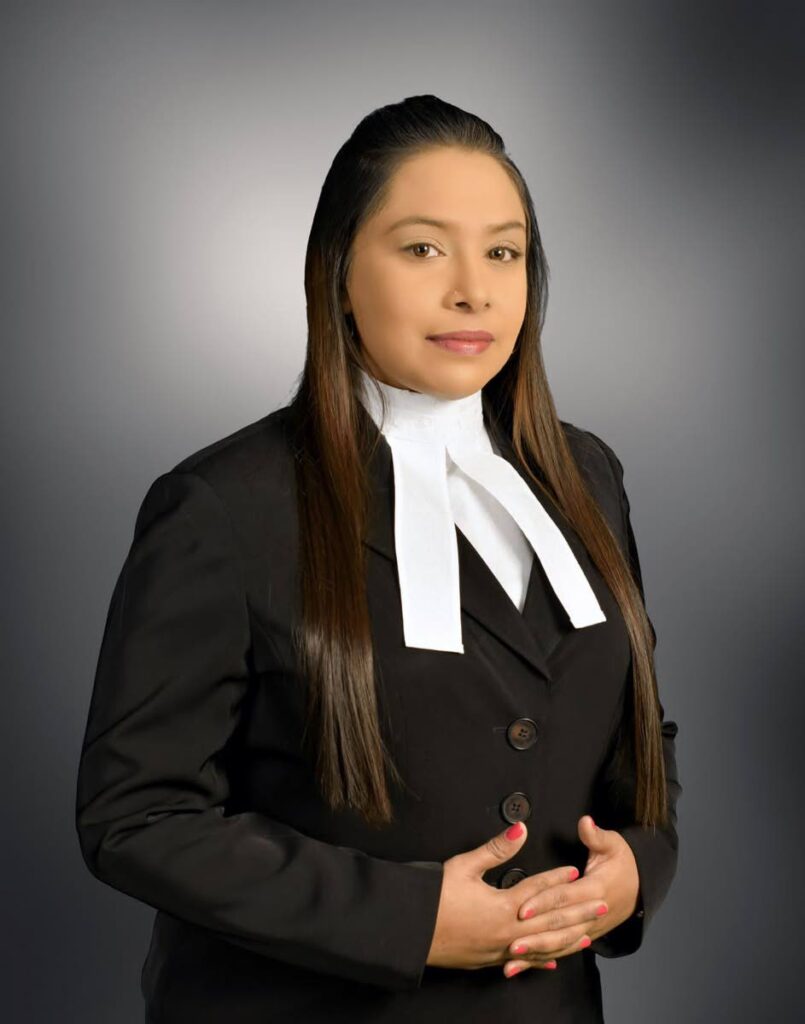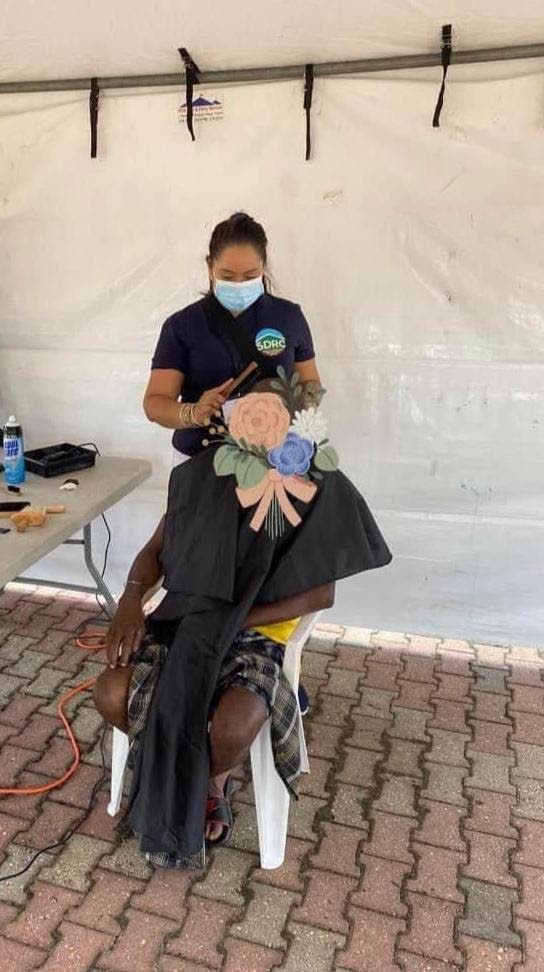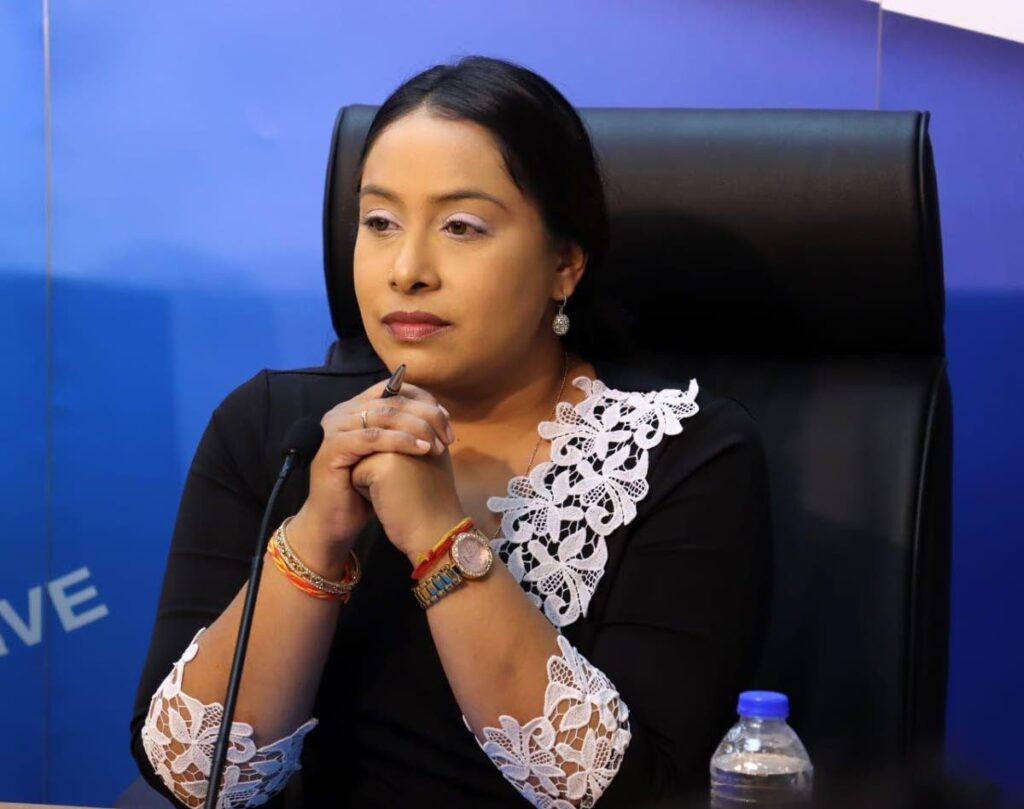Sajina Kadir champions legal intervention, social restoration for women

BAVINA SOOKDEO
Sajina Kadir, a seasoned attorney whose 14-year journey in the legal realm is intertwined with her passion for social justice, is the co-founder, director and legal adviser of the Socially Displaced Restoration Centre (SDRC).
Kadir is at the forefront of a movement dedicated to lifting the disenfranchised from the shadows of neglect.
But her impact doesn't stop there. With her leadership role in the Trinidad and Tobago Police Service Community Justice Clinic and her commitment as a tutor with the Adult Literacy Tutors Association (ALTA), Kadir embodies a holistic approach to advocacy and empowerment, championing the cause of women.
Empowering through legal intervention, education
Kadir was propelled by her affinity for reading and writing, leading her to pursue a legal career despite exam anxieties. She firmly believes that academic setbacks are mere detours in life's journey, advocating for resilience and perseverance in pursuing one's goals.
She told Newsday, “I think a lot of people go through the anxiety of passing an exam, and whilst assessment is much needed in any field of study, it really is my firm view that the result of an exam is not reflective of the true potential and capabilities of the person taking that assessment.
"I feel like I am living proof that any failure at school is but merely a detour in God’s plan versus the end of the journey. It is important this is known prior to approaching studies so any unfortunate grades do not perturb progress, but actuate an inner strength to persevere to attain the desired goals regardless of any challenges faced.”
Socially Displaced Restoration Centre (SDRC)
In response to the plight of homeless individuals in Couva, Kadir and her sister, co-founders of SDRC, tried to provide immediate relief. Starting with distributing sleeping bags, they soon expanded their operations, in collaboration with the community police, distributing meals through the Couva Community Police Station Council.
As their commitment deepened, they formalised their efforts by establishing the SDRC as a non-profit company in March 2021. Over the past three years, they have partnered with the Couva/Tabaquite/Talparo Regional Corporation and the police Central Division to make weekly food distributions.

Additionally, they organise care days on the Inshan Ali Promenade, Couva, offering showers, clean clothing, basic medical attention and hygiene packages.
“We are a company supported by the community and based on volunteerism,” Kadir explained. “Our mission is to establish an overnight shelter with rehabilitation services, and we are currently engaging the attention of the stakeholders to obtain a building in Couva for this purpose.”
Kadir’s motto
"Live in peace before you rest in peace," encapsulates Kadir’s philosophy. She advocates for prioritising love and understanding over conflicts, recognising the fleeting nature of life.
Practical steps
Asked for some examples of the work her NGO has done in addressing issues relating to women, Kadir said, “The SDRC provides assistance to women who live on the streets of Couva, three of whom are alleged to be prostitutes.
"Showing no discrimination in rendering assistance despite the choice of life in their constrained circumstances, fighting to survive, we (the SDRC) believe in inclusion and making people feel like people. We provide clothing, meals and hygiene packs for them and have made attempts to reconnect them with their families in a quest to improve their lives in some form or fashion.
"We long to do more, should the desired shelter become a reality.”
Addressing domestic violence
As an attorney, Kadir provides legal counsel to victims of domestic violence, using a compassionate approach informed by professional development in counselling and mediation.
“I have a heavy family-court practice. With regard to matters of domestic violence, I decided to enhance my understanding of persons who are victims of violence so that my approach to them, when they attend my office, is not as rigid as I originally treated with these matters.
"I pursued professional development training in counselling for victims of abuse, emotional abuse and mediation along the way, and this proved to help me relate to the victims with a bit more understanding as to their circumstances and how challenging breaking the cycle of abuse is.
"Domestic violence comes in so many forms. I believe a diligent attorney ought to guide a victim of violence to know when to seek counselling, when mediation may assist in getting to the crux of the issue to ascertain if hope exists through evaluation and counselling to mend relations and negate future issues, and when litigation solely is needed.
"Enhancing my knowledge in this capacity affords me the confidence to suggest the tool of intervention needed in the circumstances for the particular client who attends my office who faces issues of domestic violence.
"Additionally, I have realised that attorneys' fees do overwhelm persons. At times, depending on the circumstances, I use my discernment to treat urgent matters of domestic violence at no cost throughout the proceedings.”
Promoting community cohesion
SDRC promotes community cohesion by involving women from diverse backgrounds in their initiatives, encouraging mutual support and resource access to overcome challenges. During the covid19 lockdown, recognising the prevalence of domestic violence, Kadir initiated a partnership between the police and volunteer attorneys to provide free legal advice. This began as a pilot project, embraced by the public, and has expanded to serve 64 communities, including organisations like the Single Mothers' Association and Dretchi. The police Community Justice Clinic, integrated into the police service's operational plan, addresses domestic violence through court proceedings pro bono, offering immediate intervention and reducing violence statistics. This inclusive approach benefits both men and women, fostering safer relationships and environments conducive to better living.
Towards the future
On her aspirations for the SDRC and any new initiatives or programmes she hopes to implement, Kadir responded, “We presently have two ongoing initiatives; a weekly food distribution every Friday evening, and care days.
"Suffice to say this gives the socially-displaced persons a sense of belonging and a sense of hope that one day things will get better and people do in fact care.
At present, the SDRC has no physical shelter, and this gravely inhibits the possibilities for helping socially-displaced people.

There is an abandoned building occupied by several street dwellers in Couva, secluded from the main road, that has great potential to be put to use for the purpose intended by our NPO. Sadly, a notice to vacate was served on a socially displaced person to vacate the abandoned building and a representative of the authorities said the building will be demolished.
But Kadir said the SDRC has people who have committed to renovate it, with the support of the community.
"The board...of the SDRC intends to engage the attention of the relevant ministry in anticipation that the building can be salvaged and put to use to house the socially-displaced persons, as we are an NPO willing to undertake the responsibility of having Central’s only shelter with rehabilitation services.
"We can do so much more with an actual physical shelter in place.”
How to reach out
Individuals seeking support from SDRC can make contact for donations or information at 689-0044/787-1714.
Additionally, the police Community Justice Clinic offers legal advice to those in need. The clinic can be reached at 480-1421.
Kadir urges the public to explore various ministries and NGOs for additional support.
Gratitude and inspiration
Kadir acknowledges the invaluable contributions and support of loved ones and mentors in her journey of personal and professional growth, such as the immense contributions of Paula Lucie-Smith, CEO and founder of ALTA, and says tutor Lynette Milford has in many ways inspired her.
She urges all women to strive for excellence and service to humanity.
Message for women
On the occasion of International Women's Day (IWD) which was observed on March 8, Kadir encourages women facing adversities to seek assistance without shame or hesitation.
“Oftentimes in society we are so concerned with what people think that we place ourselves last.
“The shame is not the issue you face. The shame is knowing programmes exist that cost absolutely nothing but your own willingness to attend and take advantage of the free service being offered.
"Put simply, help us to help you by attending. Whether it is through the TTPS’ Community Justice Clinic or any other resources available, ask a question, get help.”
In her view, IWD “is a celebration of the reflection of what we do as women, both for ourselves, that enhances our being holistically, and also that which contributes to the greater good in society, using the skills we have acquired in ways that give back to the community and country at large.
"Service to humanity is indeed service to God, and actuated on this firm belief, I say hats off to all women who have risen to the occasion, and I urge all women to strive for excellence and be women of worth.”

Comments
"Sajina Kadir champions legal intervention, social restoration for women"